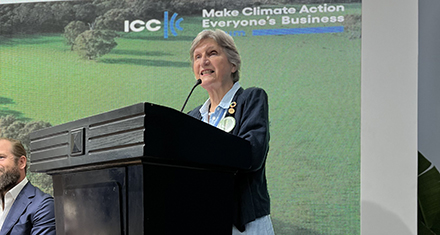Positioning the timber industry as part of the solution, not the problem, was the major message Riverina-based chair of the Australian Forest Products Association (AFPA), Diana Gibbs, took to this year’s United Nations Climate Change Conference (COP27) at Sharm el Sheikh in Egypt. Source: Timberbiz
Ms Gibbs, who returned from the conference last week, said climate change was a concern which is focussing attention from all sectors.
“There were thousands of delegates at the COP from around the world, and it was fantastic to have AFPA’s teamwork with representatives from the National Farmers Federation, to get the main message across that the world needs more forests.
“Earlier this year, AFPA commissioned a study into the likely future global demand for timber, which provided forecasts of a possible four-fold increase,” she said.
“Given this increased demand, we must urgently address where the required supply is to come from.
“This COP was supposed to be about implementation relating to climate change – but unfortunately there was a lot of discussion about the problem and not enough about how to solve it.
“Our message to the conference was we need more forests, forests are the lungs of the world, acting to take in carbon dioxide and provide oxygen.
“Everyone realises that timber is good it replaces single-use plastics in packaging, it stores carbon in our houses and in beautiful furniture. It also provides jobs in regional areas, where timber is grown and processed.
“So many of the pavilions at the conference were using timber or engineered wood products like MDF. I even saw cardboard chairs. People recognise the environmental benefits of forest products, but no one was talking about forests. Where do they think the wood is going to come from?
“Increasing requirements for more wood-based products means we need to establish more plantation forests and sustainably utilise our renewable native forests for timber production”.
Ms Gibbs said the conference was also a great networking opportunity.
“I met executives from some of the largest timber companies in the world, like Suzano in Brazil, and Storaenso in Finland, as well as leaders of international agencies such as the World Farmers Organisation.
“We created ripples and hopefully a thought process, which we will follow up on next year. People have definitely started to listen to us about why we need an expanded forest estate in Australia and globally,” she said.
“The benefit of going to the conference is that we have a lot of wonderful first-hand information to bring back to our politicians, and decision-makers. Our goal is to expand the availability of timber. And the timber industry must also be recognised for its huge potential contribution to any path to net zero.
“The timber industry, utilising both plantation and native forests, needs to be front and centre in future discussions on how to deal with climate change and achieve net zero targets.”






